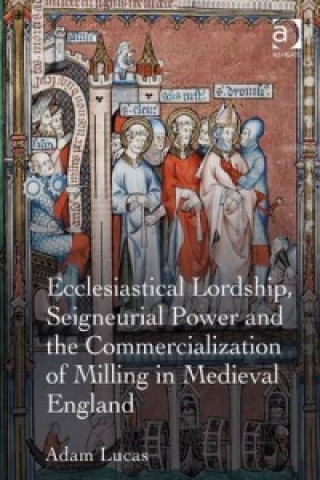
Kód: 04782575
Ecclesiastical Lordship, Seigneurial Power and the Commercialization of Milling in Medieval England
Autor Adam Lucas
This is the first detailed study of the role of the Church in the commercialization of milling in medieval England. Focusing on the period from the late eleventh to the mid sixteenth centuries, it examines the estate management pr ... celý popis
- Jazyk:
 Angličtina
Angličtina - Vazba: Pevná
- Počet stran: 436
Nakladatelství: Taylor & Francis Ltd, 2014
- Více informací o knize

4476 Kč
Dostupnost:
50 % šance Máme informaci, že by titul mohl být dostupný. Na základě vaší objednávky se ho pokusíme do 6 týdnů zajistit.
Máme informaci, že by titul mohl být dostupný. Na základě vaší objednávky se ho pokusíme do 6 týdnů zajistit.Prohledáme celý svět
Mohlo by se vám také líbit
Dárkový poukaz: Radost zaručena
- Darujte poukaz v libovolné hodnotě a my se postaráme o zbytek.
- Poukaz se vztahuje na celou naši nabídku.
- Elektronický poukaz vytisknete z e-mailu a můžete ihned darovat.
- Platnost poukazu je 12 měsíců od data vystavení.
Informovat o naskladnění knihy
Zadejte do formuláře e-mailovou adresu a jakmile knihu naskladníme, zašleme vám o tom zprávu. Pohlídáme vše za vás.
Více informací o knize Ecclesiastical Lordship, Seigneurial Power and the Commercialization of Milling in Medieval England
Nákupem získáte 448 bodů
 Anotace knihy
Anotace knihy
This is the first detailed study of the role of the Church in the commercialization of milling in medieval England. Focusing on the period from the late eleventh to the mid sixteenth centuries, it examines the estate management practices of more than thirty English religious houses founded by the Benedictines, Cistercians, Augustinians and other minor orders, with an emphasis on the role played by mills and milling in the establishment and development of a range of different sized episcopal and conventual foundations. Contrary to the views espoused by a number of prominent historians of technology since the 1930s, the book demonstrates that patterns of mill acquisition, innovation and exploitation were shaped not only by the size, wealth and distribution of a house's estates, but also by environmental and demographic factors, changing cultural attitudes and legal conventions, prevailing and emergent technical traditions, the personal relations of a house with its patrons, tenants, servants and neighbours, and the entrepreneurial and administrative flair of bishops, abbots, priors and other ecclesiastical officials.
 Parametry knihy
Parametry knihy
Zařazení knihy Knihy v angličtině Humanities History Regional & national history
4476 Kč
- Plný název: Ecclesiastical Lordship, Seigneurial Power and the Commercialization of Milling in Medieval England
- Autor: Adam Lucas
- Jazyk:
 Angličtina
Angličtina - Vazba: Pevná
- Počet stran: 436
- EAN: 9781409421962
- ISBN: 1409421961
- ID: 04782575
- Nakladatelství: Taylor & Francis Ltd
- Hmotnost: 1122 g
- Rozměry: 184 × 251 × 35 mm
- Datum vydání: 28. September 2014
Oblíbené z jiného soudku
-

Hundred Years' War on Palestine
338 Kč -

Ethnic Cleansing of Palestine
357 Kč -

History of Japan
405 Kč -

Ten Myths About Israel
336 Kč -

Strange Death of Europe
410 Kč -

Decline and Fall of the Roman Empire
130 Kč -

Secret History
303 Kč -

God's Playground A History of Poland
1700 Kč -

Mayflower
385 Kč -

How to be a Victorian
357 Kč -

Plantagenets
331 Kč -

General's Son
429 Kč -

Iran: A Very Short Introduction
225 Kč -

Temples of Karnak
3798 Kč -

Cuneiform
276 Kč -

Twenty Years A-Growing
250 Kč -

History of Witchcraft in England from 1558 to 1718
453 Kč -

China in Africa
894 Kč -

Islandman
250 Kč -

Bohemian Paris
414 Kč -

Alexiad
423 Kč -

Lancaster And York
388 Kč -

Inside Hitler's Greece
513 Kč -

Modern France: A Very Short Introduction
233 Kč -

Diana: Her True Story - In Her Own Words
306 Kč -

The Fourth Turning
441 Kč -

The Oxford History of Ancient Egypt
384 Kč -

Churchill: The Power of Words
410 Kč -

Palestine
534 Kč -

Korean History in Maps
706 Kč -

Great Gatsby (Wisehouse Classics Edition)
405 Kč -

Viking Way
1144 Kč -

The Thirteenth Tribe
308 Kč -

My Promised Land
517 Kč -

Vanished Kingdoms
514 Kč -

Age Of Revolution
410 Kč -

Life and Death of Anne Boleyn
624 Kč -

Coming of the Third Reich
464 Kč -

Children of Ash and Elm
462 Kč -

Europe Between the Oceans
798 Kč -

Socialism Betrayed
475 Kč -

303 Squadron
464 Kč -

Ancient Celts, Second Edition
624 Kč -

Dancing in the Glory of Monsters
395 Kč -

Battle of Britain: Luftwaffe Blitz (Images of War)
606 Kč -

Age of Confucian Rule
851 Kč -

Beyond Band of Brothers
410 Kč -

Benjamin Franklin
410 Kč -

On China
462 Kč
Osobní odběr Praha, Brno a 12903 dalších
Copyright ©2008-24 nejlevnejsi-knihy.cz Všechna práva vyhrazenaSoukromíCookies




 Vrácení do měsíce
Vrácení do měsíce 571 999 099 (8-15.30h)
571 999 099 (8-15.30h)